Tech
The Latest Tech News in Crypto and Blockchain

March 13 (PROTOCOL VILLAGE EXCLUSIVE): Fjord Foundry, a token-sale platform, has raised $4.3 million in a seed round led by Lemniscap, with participation from Mechanism Cap, Zee Prime Cap, Castle Capital and various renowned angels, according to the team: “Fjord offers a host of token sale methods, including its Liquidity Bootstrapping Pools (LBPs), which prioritize equitable distribution, mitigating the risk of whale manipulation and bots. The round comes as Fjord is preparing to announce all-inclusive chain aggregation and the upcoming launch of its native utility token FJO.”
Avail’s Arjun Joins Layer-1 Ternoa as Strategic Advisor
March 13: Anurag Arjun, a Polygon co-founder who now leads the data-availability project Avail, has joined Ternoa as a strategic advisor, according to the team: “Ternoa has been a Layer 1 blockchain and TEE coprocessor infrastructure provider in the mainnet since 2022 and will launch a zkEVM layer-2 validium. As an advisor, Anurag will provide strategic counsel to Ternoa’s leadership team, offering insights and recommendations to drive the company’s growth and success and navigate Ethereum’s layer-2 ecosystem.
Sovryn, Bitcoin DeFi Platform, Expands to BOB, a Bitcoin/Ethereum ‘Hybrid L2’
March 13: Sovryn, a Bitcoin DeFi platform with $136 million of total value locked (TVL), is “expanding to BOB, a Bitcoin and Ethereum hybrid layer 2 that offers unparalleled security and access to deep liquidity by integrating with both ecosystems,” according to the team: “This partnership aims to channel Ethereum’s liquidity into Bitcoin DeFi and convert Ethereum users into Bitcoin adopters. Sovryn will deploy its DeFi suite on BOB, including Sovryn Dex 2.0 with lower gas fees and faster transactions than Uniswap. Launch is timed around the Bitcoin halving, signaling the start of a ‘Bitcoin summer’ amid rising interest for Bitcoin DeFi and L2s.”
Injective Integrates With Noble to Add USDC
March 13: Injective today announced its integration with Noble, native issuer of USDC within the Injective blockchain ecosystem, to add the stablecoin. According to the team: “Users now have direct access to native USDC – accessing its substantial $30.4 billion market cap – through a diverse set of Injective ecosystem dApps (e.g., Helix). This integration facilitates improved user experiences where TradFi offerings can be deployed in DeFi environments.” (INJ)
Ethereum Staking Protocol Swell Unveils Layer-2 Rollup With $1B Total Value Locked
March 13: Ethereum staking protocol Swell has introduced a layer-2 rollup with $1 billion in total value locked (TVL) using Polygon’s chain development kit (CDK). Swell developed the rollup alongside Ethereum scaler AltLayer and a16z-backed crypto staking project EigenLayer. A layer 2 is a protocol designed to scale a blockchain’s capacity by executing transactions off-chain and packaging them together for submission to the main network. The rollup will take the form of a “restaked rollup,” which comes with a range of services such as decentralized sequencing, verification and faster finality, Swell said on Wednesday.
Movement Integrates Aptos’s Data Availability Capabilities
March 13: Movement is integrating Aptos’s Data Availability (DA) capabilities with the Move Stack and establishing sophisticated routing infrastructure between Movement, an Ethereum Virtual Machine (EVM) blockchain and Aptos (a non-EVM) blockchain, according to the team: “Collaboration between Aptos Foundation and Movement will enable applications, networks and frameworks on Movement to seamlessly interact with the Aptos blockchain, marking a significant milestone towards a more interconnected and efficient global blockchain ecosystem.”
Pyth Introduces ‘Pyth Entropy’ as Random Number Generator
March 13: Pyth Network, a data oracle, introduced “Pyth Entropy” as a random number generator (RNG) for blockchain apps, according to the team: “Trustless RNG is critical for Web3 applications designed to deliver unpredictable outcomes across gaming, NFTs, lotteries, betting markets and more. Developers on Arbitrum, Blast, Chiliz Chain, Fantom, LightLink, Optimism are the first to have access to Entropy on their native mainnet environments.”
PropyKeys Announces DApp for Minting Digital Addresses for Tangible Properties
March 13: PropyKeys, a project within the Propy ecosystem known for its blockchain-powered real estate solutions, announced the public launch of their decentralized application (dApp), which enables users to mint a digital address corresponding to a tangible property, according to the team: “Deployed on Base, Coinbase’s layer-2 network, and powered by the PRO token, users can mint digital versions of any home addresses or global landmarks. Furthering Propy’s mission to democratize real estate ownership, PropyKeys is creating a home addresses platform and property deed storage on the blockchain.
SendingNetwork Launches Bandwidth Mining Testnet
March 13: SendingNetwork, communication infrastructure for Web3, launches its bandwidth mining testnet. This initiative is set to transform the digital communication space by leveraging underused bandwidth to create a decentralized, secure and efficient network.
Vega Protocol Launches ‘Points’ Futures, Starting With Market on EigenLayer
March 13: Vega Protocol, a purpose-built blockchain for decentralized derivatives trading, is launching the first futures markets for “points,” according to the team. The first markets are for EigenLayer points, with more expected soon. Vega’s permissionless points markets work by allowing anyone to propose the creation of derivatives markets for points. The community defines the market parameters, including the settlement methodology. Vega uses UMA’s Optimistic Oracle to resolve each points market at the time of the “Airdrop Event,” which triggers settlement and determines the price per point. Users can assert claims to the oracle, which are verified on-chain if undisputed. This decentralized framework enables complex market rulesets without relying on a single centralized custodian.
ClearToken Raises $10M From Institutional Investors Including Nomura’s Laser Digital
March 13: Cleartoken, a cryptocurrency clearing house, has received over $10 million in seed investment from institutional investors, the company said Wednesday. Investment came from firms including Laser Digital, the digital assets subsidiary of Nomura, liquidity providers including Flow Traders and GSR and from digital asset companies LMAX Digital and Zodia Custody.
On-Chain Game DEAR Using ARPA’s On-Chain Random Number Generator
March 13: DEAR, the first fully on-chain game inbubated by ARPA Network, is now live on Redstone Holesky, according to the team: “DEAR utilizes Randcast, ARPA Network’s on-chain, verifiable random number generator (RNG), designed with a comprehensive suite of APIs to support Fully On-Chain Games (FOCG) and Autonomous Worlds. Randcast offers a cryptographically generated random source with superior security and low cost compared to other solutions. Metaverse, game, lottery, NFT minting and whitelisting, key generation, and blockchain validator task distribution can benefit from Randcast’s tamper-proof randomness.”
Protocol Village is a regular feature of The Protocol, our weekly newsletter exploring the tech behind crypto, one block at a time. Sign up here to get it in your inbox every Wednesday. Project teams can submit updates here. For previous versions of Protocol Village, please go here. Also please check out our weekly The Protocol podcast.
Elixir, Decentralized Network for Orderbook Exchanges, Raises $8M
March 12: Elixir, a decentralized network that improves liquidity across orderbook exchanges, completed an $8 million Series B funding round, “bringing the project’s valuation to $800 million,” according to the team: “Mysten Labs and Maelstrom co-led the round, which also included participation from Manifold, Arthur Hayes, Amber Group, GSR, Flowdesk, Validation Cloud and others. Elixir allows users to supply liquidity to pairs on orderbook exchanges while earning rewards, including on Vertex, Bluefin and RabbitX – and soon dYdX, ApeX, Hyperliquid, Orderly, NFTPerp and more.”
RSS3, Decentralized Information Layer, Launches Mainnet Alpha
March 12: RSS3, a decentralized network designed to promote the free flow of information on the open web, said its Mainnet Alpha was set to go live on March 11 at 6 p.m. Pacific time (1 a.m. UTC on March 12). According to the team: “Inspired by the original RSS protocol, RSS3 is aiming to enhance information freedom through decentralization. The unique Mainnet design consists of 3 parts: indexing nodes, structuring open data and a layer 2 focusing on AI and information. RSS3 nodes will be equipped with the capability to cover specific data sources, create search engines, and build local-first open AI models.”
Schematic of RSS3 “data sublayer,” from the project’s whitepaper (RSS3)
NibiruChain, Layer-1 Chain, Launches Mainnet, Claiming Capability of 40K TPS
March 12: NibiruChain, a layer-1 blockchain built by founders from Google, Tendermint, IBM and Sommelier, is announcing the launch of its public mainnet, according to the team: “Nibiru aims to address users’ onboarding challenges and provide a fully mainstream decentralized multichain solution. It is capable of processing 40,000 TPS with instant finality, made possible through parallel optimistic execution. Nibiru reduces the complexities associated with L2s by offering proven interoperability with other L1s, a fully sovereign network and increased developer infrastructure of its own.” Smart contracts on Nibiru are written in Rust CosmWasm, which runs in the WebAssembly runtime, according to the project’s documentation.
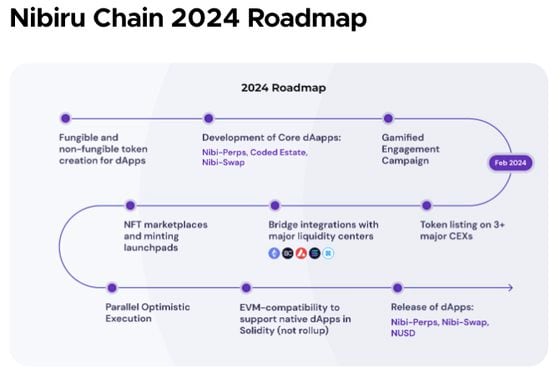 (Nibiru)
(Nibiru)
Bluwhale, AI Platform to Connect Companies to Web3 Wallet Holders, Raises $7M
March 12: Bluwhale, a San Francisco-based AI-powered platform designed to connect companies with Web3 wallet holders, disclosed that it raised $7 million in seed funding. SBI led the round and was joined by Cardano, Momentum6, Primal Capital, NxGen, Ghaf Capital Partners, Spyre Capital, Baselayer Capital and others.
Goldman Sachs, BNY Mellon and Others Test Enterprise Blockchain for Tokenized Assets
March 12: Bluechip financial blockchain provider Digital Asset has completed a test of its so-called Canton Network, with the participation of financial heavyweights like Goldman Sachs, BNY Mellon, DRW, Oliver Wyman,and Paxos. The Canton pilot, which involved 15 asset managers, 13 banks, four custodians and three exchanges, allowed the firms to seamlessly transact and settle tokenized assets and deal with fund registry, digital cash, repo, securities lending, and margin management transactions, according to a press release on Tuesday.
Studio369, Gaming Studio in Production With Web3 Publisher Immutable Games, Raises $5M
March 12: Studio369, the game development company behind the upcoming blockchain-powered multiplayer PvP-focused shooter MetalCore, announced the raise of $5 million via a new funding round with participation from BITKRAFT Ventures, Delphi Digital, Sanctor Capital, Spartan Group and other investors.
Solana-Based Solend Expands to Sui, in Search of ‘Better Developer Tools’
March 11: The team behind Solana-based lending protocol Solend has launched Suilend on the Sui Mainnet, marking the team’s first venture outside of the Solana ecosystem: “Solend, which boasts over $200 million in TVL across 170,000+ users with support for 70+ assets, brings its unparalleled DeFi expertise and experience building industry-leading lending protocols to the Sui ecosystem, adding to the quickly expanding depth of the network.” Rooter, Solend’s pseudonymous founder, said in a comment emailed by the Sui team: “Developing on Ethereum and Solana felt like building a cathedral with chisels and hammers. That’s not to say you can’t build great things; cathedrals are some of the most beautiful human achievements. But we want to build rocket ships, and for that, you need advanced tools like laser cutters and welders. That’s what Sui and Move offer with better developer tools.”
Bitcoin Restaking Protocol BounceBit Launches Testnet
March 11: BounceBit, a Bitcoin restaking infrastructure protocol, launched its testnet on March 8, “offering the opportunity to users to experience a dual-token staking PoS Layer 1, which uses BTC as well as the native BounceBit token to secure the network with liquid staking,” according to the team: “BounceClub, a no-code solution for on-chain development, will go live on BounceBit as testnet event. Users who participate in Early Access will be given a free BounceClub. Mainnet is set to launch late April, at the Bitcoin halving.” CoinDesk 20 asset: (BTC)
NFTfi, Peer-to-Peer Lending Protocol for NFTs, Raises $6M in Series A1 Round
March 11: NFTfi, a peer-to-peer, decentralized lending protocol for loans collateralized with NFTs, has raised $6M in a Series A1 fundraising, led by Placeholder VC, bringing total funding to $15M, according to the team: “Notable co-investors include Maven 11, Launch Labs Inc, Kahuna Ventures. Launched in 2020, NFTfi pioneers NFT Finance, facilitating significant on-chain loans. Future plans include enhancing dApp features, expanding SDK capabilities, and creating an open settlement layer for NFT finance. NFTfi allows NFT holders to borrow ETH, USDC or DAI from lenders using their NFTs as collateral, in a trustless P2P manner.”
Rarimo Community Reveals ‘Russia2024’ as Use Case for Survelliance-Free Polling Tool
March 11: Members of the Rarimo community, a digital identity protocol, revealed that “Russia2024 is the first use case of the recently launched Freedom Tool, an open-source solution for citizen-run, surveillance-free elections and polling.” According to the team: “Russia2024 is an encrypted polling app allowing dissenting Russian citizens to sign petitions, vote in polls and participate in protest elections without being traced. As a Freedom Tool application, Russia2024 uses zero-knowledge cryptography servers to ensure the safety and anonymity of its users, and votes are published directly onto the blockchain where they are tamper-proof. It was announced by opposition activist Mark Fegyin.”
With Mastercard, MetaMask Tests First Blockchain-Powered Payment Card
March 11: MetaMask, the popular cryptocurrency wallet for the Ethereum blockchain, is testing an entirely on-chain payment card running on Mastercard’s giant network and issued by Baanx, according to promotional materials and a testing platform seen by CoinDesk.
Blockchain Builder Eclipse Labs Raises $50M Ahead of Layer-2’s Mainnet Debut
March 11: Eclipse Labs, the company building a blockchain to scale Ethereum using parts from Solana, raised $50 million ahead of its mainnet debut, which should come within weeks. According to the story by CoinDesk’s Danny Nelson: “Eclipse seeks to use a mix of technology from Solana, Celestia, Ethereum and RISC Zero for its proposed scaling solution – basically, speed like Solana with security provided by Ethereum. Apps built for Solana will be able to run on Eclipse with minimal changes, with SOL being the token of the realm.”
StargateDAO Votes to Remove Daily Limits on Aptos Bridge on LayerZero
March 11: Aptos Foundation, LayerZero, and Stargate are expanding their integration to remove transaction limits and publish educational resources that help users navigate DeFi on Aptos while benefiting from interoperability, according to the team: “Stargate’s Aptos Bridge, built directly on the LayerZero protocol, facilitates seamless asset transfers between Aptos and other chains, allowing builders and users to bridge tokens and use assets across blockchains. StargateDAO has elected to remove the daily transaction limit on the Aptos Bridge, allowing for unrestricted activity and enhanced scalability for builders using the bridge.” {{APTOS}}
Location-Based NFT Platform Lost Worlds Launches ‘Creation Portal’ for ‘GeoNFT’ Minting
March 11: Lost Worlds, a project for location-based NFTs, has launched “Creation Portal” to enable simplified “geoNFT” minting. The portal is designed to integrate digital assets with real-world places by simplifying the process for users to mint geoNFTs. “Previously, creating and deploying geoNFTs required direct coordination with the Lost Worlds team. The Creation Portal changes this, opening the doors to anyone – from individual enthusiasts to large-scale projects – interested in crafting and exploring geoNFTs across any supported blockchain,” according to a press release. The project is supported by Ava Labs and Polygon, according to the team.
Pi Network to Require Ad Buyers on Browser, Apps to Pay in PI Tokens
March 11: Pi Network, a utilities-based ecosystem for third-party apps on a mobile web platform, said in a message from the team that “after the Open Network period is launched, advertisers or parties that want to place ads on Pi Browser and Pi Apps in the Pi Ecosystem will have to acquire PI and use such PI to pay the Pi platform for displaying ads. PI will, in turn, be distributed to the developers of Pi Apps displaying ads on the platform. In this way, the ad network will generate additional platform-level utility for PI, and thus, benefit the whole network.” An explanation of the design and benefits is in the announcement.
Arbitrum Orbit Layer 3s Now Available on Coinbase Layer-2 Base
March 8: Coinbase’s head of protocols, Jesse Pollak, tweeted that it’s now possible to “build Arbitrum Orbit L3s on Base,” which is the U.S. crypto exchange’s layer-2 network atop Ethereum.” (ARB)
S3 Launches as ‘Stablecoin Studio’ on Sui Blockchain
March 8: S3, described as a “stablecoin studio,” launched on the layer-1 Sui blockchain, marking a key network functionality upgrade. According to the team: “S3, powered by Cairo-based blockchain startup Pravica, provides builders on the Sui blockchain with the opportunity to seamlessly launch native stablecoins without the complexities of smart contract development and currency management. S3 simplifies the process for existing stablecoin issuers, such as USDC and USDT, to integrate with Sui, and also facilitates the creation of bespoke stablecoin solutions tailored to meet specific regulatory requirements in various jurisdictions.”
GoPlus Security, Web3 User Security Network, Raises $4M
March 8: GoPlus Security, a leading Web3 user security network, successfully concluded its Series II+ funding round with $4 million, according to the team: “This latest round brings the project’s cumulative fundraising total to $15 million, including funds raised in a private round led by Binance Labs with contributions from Redpoint China Ventures, Avalanche and others. GoPlus is reshaping Web3 security, offering transparent access and introducing a new platform ‘SecWareX’ to empower users. Their aim is to emerge as the foremost provider of User Security Modules as a Service across various blockchains.”
Celo Integrates Rarible’s API Solution
March 8: Celo Foundation and Rarible announced the integration of Rarible’s new API solution on the Celo blockchain, designed for fast, low-cost payments, according to the team: “Through the integration, creators and developers building on Celo can leverage a robust toolkit of solutions for their decentralized applications (dApps) which include: Real-time NFT indexer, aggregated order book, multi-chain support, powerful trading SDK.”
RepubliK, Blockchain-Enabled System for Rewarding Artists, Launches AI-Powered ‘SocialFi’ Platform
March 8: RepubliK, a blockchain-enabled platform for rewarding artists and creators, is launching a new AI-powered SocialFi platform on March 8, according to a press release: “Teaming up with AWS AI and ML, it plans to change how content is assessed and user interactions are analyzed. Instead of just popularity, the platform focuses on quality interactions with the help of AI. It’s also making its technology better with a layer-2 solution and multi-chain approach, which will help transactions run smoother and support more people.”
Dfinity Releases ‘DocuTrack’ for Sending Encrypted Documents
March 7: The DFINITY Foundation, supporting the Internet Computer blockchain, announced the open alpha release of DocuTrack, “an open source decentralized application developed in collaboration with a Swiss private bank to enable secure encrypted document transfer between enterprises and their clients on-chain,” according to the team: “DocuTrack enables registered and unregistered users to securely transfer sensitive documents like applications, property deeds and identity certificates in an encrypted format.” (ICP)
Cryptography Firm Zama Raises $73M for ‘Fully Homomorphic Encryption’ Apps
March 7: Open-source cryptography firm Zama has raised $73 million in Series A funding to develop applications based on fully homomorphic encryption (FHE), a technology that enables data to be processed without decrypting it – potentially useful for protecting privacy in blockchain and AI. The funding round was led by Multicoin Capital and Protocol Labs, Zama announced via email on Thursday. Participating investors included Solana co-founder Anatoly Yakovenko, Filecoin founder Juan Benet and Ethereum and Polkadot co-founder Gavin Wood, according to a press release.
 Rand Hindi, CEO of Zama (Zama)
Rand Hindi, CEO of Zama (Zama)
Sonarverse, Provider of Datasets on Blockchains, Raises $7M in Seed Round
March 7: Sonarverse, which according to its website offers “curated, reliable datasets for over 32 chains by leveraging Snowflake technology,” has raised $7 million in a seed funding round, led by BlockTower Capital with participation from United Overseas Bank, Aglaé Ventures, Third Prime Ventures, Ocular Funds, Aptos, FBG and FJ Labs. According to the team: “Obtaining comprehensive, high-quality blockchain data is challenging, yielding incomplete data often riddled with quality issues without extensive infrastructure. Sonarverse resolves this pain point with powerful multi-chain data solutions capturing the ecosystem’s complete story – 3X+ more chains w/ plans to be into the 100s of chains this year and rapidly cover new chains as clients demand.”
Virtual Phone App ‘APhone’ Launches Via Solana
March 7: APhone, a device-agnostic web-based virtual phone app, announced its official launch via the Solana ecosystem, according to a press release: “APhone NFTs, which give users access to the in-app experience, can be minted and activated (burned) directly on the Solana chain. As an affordable DePIN-powered virtual mobile phone app, charging $20 per year, APhone bypasses the hardware limitations of older phone models and enables access to Solana’s strong DePIN ecosystem, where GPU, storage, and RAM are essential for seamless functionality.”
Burnt Banksy Launches XION Blockchain, With USDC as Primary Currency
March 7: Burnt Banksy announced the launch of XION’s mainnet, “the first blockchain purpose-built for mainstream adoption and the first to use USDC, a fully-reserved digital dollar, as its primary transactional currency,” according to the team: “The announcement was made as part of Burnt’s exclusive performance in New York, during which the founder lit himself on fire and subsequently set XION aflame, symbolizing a new light for the crypto industry.”
 Image shared by a rep of Burnt Banksy’s performance at XION blockchain launch in Brooklyn on Wednesday. (Burnt Banksy)
Image shared by a rep of Burnt Banksy’s performance at XION blockchain launch in Brooklyn on Wednesday. (Burnt Banksy)
Blackwing, Developer of Modular Layer-2 Chain for Trading, Raises $4.5M
March 7: New York-based Blackwing, founded by ex-Meta and Robinhood vets, raised $4.5 million, led by Hashed VC and gumi Cryptos Capital, according to the team: “Blackwing developed the first modular layer 2 blockchain designed for liquidation-free leveraged trading. The blockchain uses ‘Limitless Pools’ that enable users to trade with borrowed funds without facing forced liquidations, ensuring liquidity providers benefit from earning more fees, and traders benefit from safer leverage.”
Core Foundation Announces $5M ‘Innovation Fund’ Focused on India
March 7: Core Foundation announced a $5 million Innovation Fund to advance India’s decentralized application ecosystem on Core Chain, a Bitcoin-secured and EVM-compatible blockchain, according to the team: “This fund aims to empower Web3 communities, enhance education, and provide vital support to founders and builders throughout India.” According to its project documentation, Core Chain runs on a consensus mechanism known as “Satoshi Plus that unites Delegated Proof of Work (DPoW) and Delegated Proof of Stake (DPoS).”
Web3 Messaging Platform Beoble Gets Strategic Investment From Animoca
March 7: Beoble, a Web3 messaging platform, has received strategic investment from Animoca Brands, according to the team: “This investment will be used by beoble to enhance user interaction, privacy and security through blockchain technology, as well as expand advanced Web3 chat features to selected companies within Animoca Brands’ portfolio. The new funding will be used to accelerate the platform’s development and expand its features, offering greater interoperability to its user base globally.”
DeFi Aggregator Hashflow Launches on Arbitrum
March 7: Hashflow, a leading decentralized finance (DeFi) trading platform, today announced the launch of its Arbitrum-native aggregator, creating a hub for all Arbitrum ecosystem traders, according to the team: “Through its intent-based, Smart Order Routing architecture, Hashflow’s new product, Aggregator+, enables traders to tap into roughly $8B of liquidity to get the best prices on the most popular tokens on Arbitrum. As the Arbitrum DeFi community continues to expand rapidly, Hashflow is positioning itself as a one-stop trading platform for all users in the ecosystem.” (ARB)
Wert, Web3 Facilitator of Fiat Payments, Broadens Card Acceptance to JCB, Amex, Discover
March 7: Wert, a payment solution provider facilitating fiat payments in the Web3 space, is set to broaden its card acceptance to JCB, American Express (Amex) and Discover cards in collaboration with Worldpay, a global payment processor, according to the team: “This promotes broader engagement from non-crypto native users and nurtures inclusivity in the Web3 space. Now, Wert will support cards for holders in a staggering 198 countries, giving seamless access to web3 for the estimated 121M Amex, 140M JCB and the roughly 57M Discover cardholders.”
Tech
Harvard Alumni, Tech Moguls, and Best-Selling Authors Drive Nearly $600 Million in Pre-Order Sales
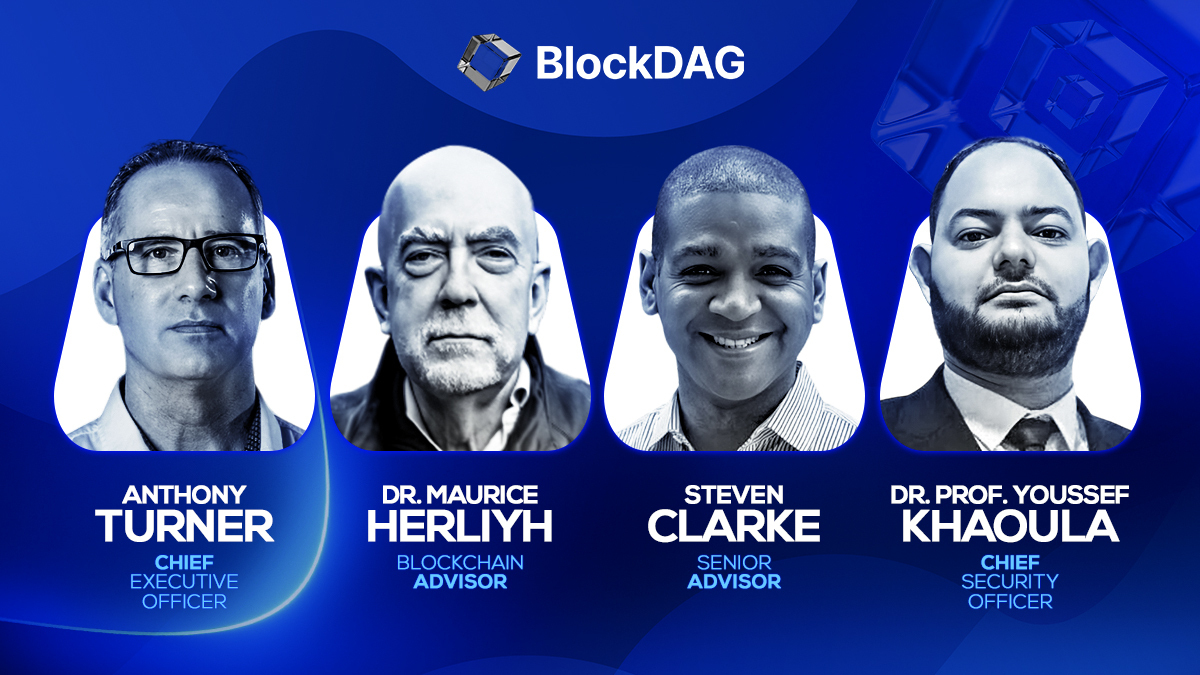
BlockDAG Network’s history is one of innovation, perseverance, and a vision to push the boundaries of blockchain technology. With Harvard alumni, tech moguls, and best-selling authors at the helm, BlockDAG is rewriting the rules of the cryptocurrency game.
CEO Antony Turner, inspired by the successes and shortcomings of Bitcoin and Ethereum, says, “BlockDAG leverages existing technology to push the boundaries of speed, security, and decentralization.” This powerhouse team has led a staggering 1,600% price increase in 20 pre-sale rounds, raising over $63.9 million. The secret? Unparalleled expertise and a bold vision for the future of blockchain.
Let’s dive into BlockDAG’s success story and find out what the future holds for this cryptocurrency.
The Origin: Why BlockDAG Was Created
In a recent interview, BlockDAG CEO Antony Turner perfectly summed up why the market needs BlockDAG’s ongoing revolution. He said:
“The creation of BlockDAG was inspired by Bitcoin and Ethereum, their successes and their shortcomings.
If you look at almost any new technology, it is very rare that the first movers remain at the forefront forever. Later incumbents have a huge advantage in entering a market where the need has been established and the technology is no longer cutting edge.
BlockDAG has done just that: our innovation is incorporating existing technology to provide a better solution, allowing us to push the boundaries of speed, security, and decentralization.”
The Present: How Far Has BlockDAG Come?
BlockDAG’s presale is setting new benchmarks in the cryptocurrency investment landscape. With a stunning 1600% price increase over 20 presale lots, it has already raised over $63.9 million in capital, having sold over 12.43 billion BDAG coins.
This impressive performance underscores the overwhelming confidence of investors in BlockDAG’s vision and leadership. The presale attracted over 20,000 individual investors, with the BlockDAG community growing exponentially by the hour.
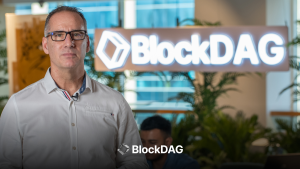
These monumental milestones have been achieved thanks to the unparalleled skills, experience and expertise of BlockDAG’s management team:
Antony Turner – Chief Executive Officer
Antony Turner, CEO of BlockDAG, has over 20 years of experience in the Fintech, EdTech, Travel and Crypto industries. He has held senior roles at SPIRIT Blockchain Capital and co-founded Axona-Analytics and SwissOne. Antony excels in financial modeling, business management and scaling growth companies, with expertise in trading, software, IoT, blockchain and cryptocurrency.
Director of Communications
Youssef Khaoulaj, CSO of BlockDAG, is a Smart Contract Auditor, Metaverse Expert, and Red Team Hacker. He ensures system security and disaster preparedness, and advises senior management on security issues.
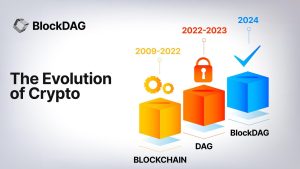
advisory Committee
Steven Clarke-Martin, a technologist and consultant, excels in enterprise technology, startups, and blockchain, with a focus on DAOs and smart contracts. Maurice Herlihy, a Harvard and MIT graduate, is an award-winning computer scientist at Brown University, with experience in distributed computing and consulting roles, most notably at Algorand.
The Future: Becoming the Cryptocurrency with the Highest Market Cap in the World
Given its impressive track record and a team of geniuses working tirelessly behind the scenes, BlockDAG is quickly approaching the $600 million pre-sale milestone. This crypto powerhouse will soon enter the top 30 cryptocurrencies by market cap.
Currently trading at $0.017 per coin, BlockDAG is expected to hit $1 million in the coming months, with the potential to hit $30 per coin by 2030. Early investors have already enjoyed a 1600% ROI by batch 21, fueling a huge amount of excitement around BlockDAG’s presale. The platform is seeing significant whale buying, and demand is so high that batch 21 is almost sold out. The upcoming batch is expected to drive prices even higher.

Invest in BlockDAG Pre-Sale Now:
Pre-sale: https://purchase.blockdag.network
Website: https://blockdag.network
Telegram: https://t.me/blockDAGnetwork
Discord: Italian: https://discord.gg/Q7BxghMVyu
No spam, no lies, just insights. You can unsubscribe at any time.
Tech
How Karak’s Latest Tech Integration Could Make Data Breaches Obsolete
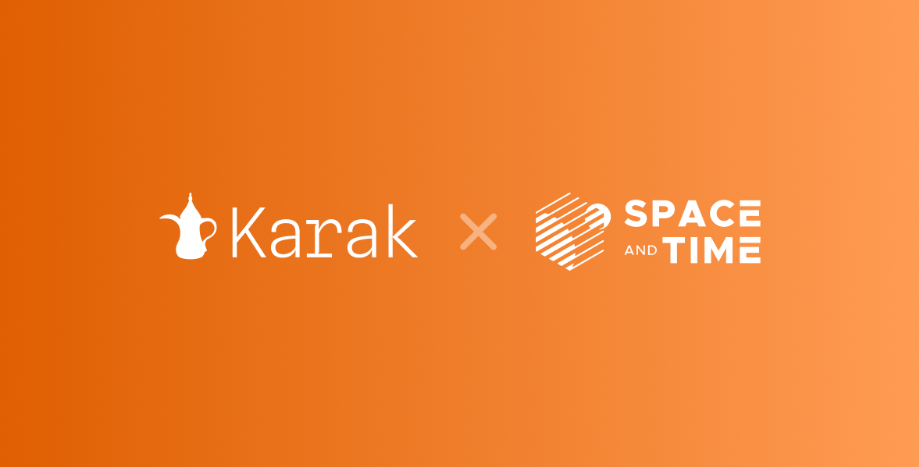
- Space and Time uses zero-knowledge proofs to ensure secure and tamper-proof data processing for smart contracts and enterprises.
- The integration facilitates faster development and deployment of Distributed Secure Services (DSS) on the Karak platform.
Karak, a platform known for its strong security capabilities, is enhancing its Distributed Secure Services (DSS) by integrating Space and Time as a zero-knowledge (ZK) coprocessor. This move is intended to strengthen trustless operations across its network, especially in slashing and rewards mechanisms.
Space and Time is a verifiable processing layer that uses zero-knowledge proofs to ensure that computations on decentralized data warehouses are secure and untampered with. This system enables smart contracts, large language models (LLMs), and enterprises to process data without integrity concerns.
The integration with Karak will enable the platform to use Proof of SQL, a new ZK-proof approach developed by Space and Time, to confirm that SQL query results are accurate and have not been tampered with.
One of the key features of this integration is the enhancement of DSS on Karak. DSS are decentralized services that use re-staked assets to secure the various operations they provide, from simple utilities to complex marketplaces. The addition of Space and Time technology enables faster development and deployment of these services, especially by simplifying slashing logic, which is critical to maintaining security and trust in decentralized networks.
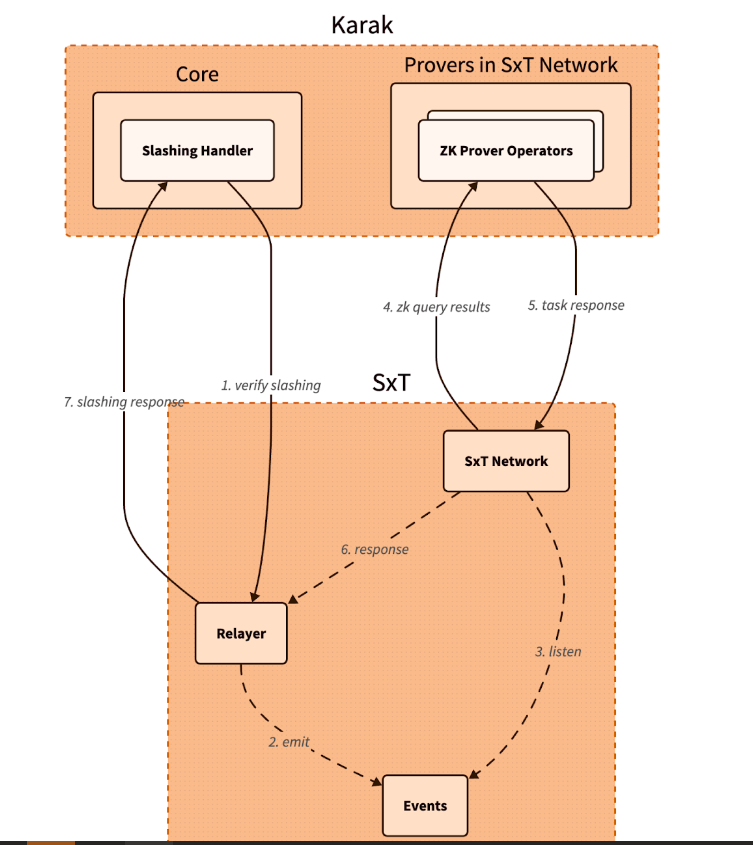
Additionally, Space and Time is developing its own DSS for blockchain data indexing. This service will allow community members to easily participate in the network by running indexing nodes. This is especially beneficial for applications that require high security and decentralization, such as decentralized data indexing.
The integration architecture follows a detailed and secure flow. When a Karak slashing contract needs to verify a SQL query, it calls the Space and Time relayer contract with the required SQL statement. This contract then emits an event with the query details, which is detected by operators in the Space and Time network.
These operators, responsible for indexing and monitoring DSS activities, validate the event and route the work to a verification operator who runs the query and generates the necessary ZK proof.
The result, along with a cryptographic commitment on the queried data, is sent to the relayer contract, which verifies and returns the data to the Karak cutter contract. This end-to-end process ensures that the data used in decision-making, such as determining penalties within the DSS, is accurate and reliable.
Karak’s mission is to provide universal security, but it also extends the capabilities of Space and Time to support multiple DSSs with their data indexing needs. As these technologies evolve, they are set to redefine the secure, decentralized computing landscape, making it more accessible and efficient for developers and enterprises alike. This integration represents a significant step towards a more secure and verifiable digital infrastructure in the blockchain space.
Website | X (Twitter) | Discord | Telegram
No spam, no lies, just insights. You can unsubscribe at any time.
Tech
Cryptocurrency Payments: Should CFOs Consider This Ferrari-Approved Trend?

Iconic Italian luxury carmaker Ferrari has announced the expansion of its cryptocurrency payment system to its European dealer network.
The move, which follows a successful launch in North America less than a year ago, raises a crucial question for CFOs across industries: Is it time to consider accepting cryptocurrency as a form of payment for your business?
Ferrari’s move isn’t an isolated one. It’s part of a broader trend of companies embracing digital assets. As of 2024, we’re seeing a growing number of companies, from tech giants to traditional retailers, accepting cryptocurrencies.
This change is determined by several factors:
- Growing mainstream adoption of cryptocurrencies
- Growing demand from tech-savvy and affluent consumers
- Potential for faster and cheaper international transactions
- Desire to project an innovative brand image
Ferrari’s approach is particularly noteworthy. They have partnered with BitPay, a leading cryptocurrency payment processor, to allow customers to purchase vehicles using Bitcoin, Ethereum, and USDC. This satisfies their tech-savvy and affluent customer base, many of whom have large digital asset holdings.
Navigating Opportunities and Challenges
Ferrari’s adoption of cryptocurrency payments illustrates several key opportunities for companies considering this move. First, it opens the door to new customer segments. By accepting cryptocurrency, Ferrari is targeting a younger, tech-savvy demographic—people who have embraced digital assets and see them as a legitimate form of value exchange. This strategy allows the company to connect with a new generation of affluent customers who may prefer to conduct high-value transactions in cryptocurrency.
Second, cryptocurrency adoption increases global reach. International payments, which can be complex and time-consuming with traditional methods, become significantly easier with cryptocurrency transactions. This can be especially beneficial for businesses that operate in multiple countries or deal with international customers, as it potentially reduces friction in cross-border transactions.
Third, accepting cryptocurrency positions a company as innovative and forward-thinking. In today’s fast-paced business environment, being seen as an early adopter of emerging technologies can significantly boost a brand’s image. Ferrari’s move sends a clear message that they are at the forefront of financial innovation, which can appeal to customers who value cutting-edge approaches.
Finally, there is the potential for cost savings. Traditional payment methods, especially for international transactions, often incur substantial fees. Cryptocurrency transactions, on the other hand, can offer lower transaction costs. For high-value purchases, such as luxury cars, these savings could be significant for both the business and the customer.
While the opportunities are enticing, accepting cryptocurrency payments also presents significant challenges that businesses must address. The most notable of these is volatility. Cryptocurrency values can fluctuate dramatically, sometimes within hours, posing potential risk to businesses that accept them as payment. Ferrari addressed this challenge by implementing a system that instantly converts cryptocurrency received into traditional fiat currencies, effectively mitigating the risk of value fluctuations.
Regulatory uncertainty is another major concern. The legal landscape surrounding cryptocurrencies is still evolving in many jurisdictions around the world. This lack of clear and consistent regulations can create compliance challenges for companies, especially those operating internationally. Companies must remain vigilant and adaptable as new laws and regulations emerge, which can be a resource-intensive process.
Implementation costs are also a significant obstacle. Integrating cryptocurrency payment systems often requires substantial investment in new technology infrastructure and extensive staff training. This can be especially challenging for small businesses or those with limited IT resources. The costs are not just financial; a significant investment of time is also required to ensure smooth implementation and operation.
Finally, security concerns loom large in the world of cryptocurrency transactions. While blockchain technology offers some security benefits, cryptocurrency transactions still require robust cybersecurity measures to protect against fraud, hacks, and other malicious activity. Businesses must invest in robust security protocols and stay up-to-date on the latest threats and protections, adding another layer of complexity and potential costs to accepting cryptocurrency payments.
Strategic Considerations for CFOs
If you’re thinking of following in Ferrari’s footsteps, here are the key factors to consider:
- Risk Assessment: Carefully evaluate potential risks to your business, including financial, regulatory, and reputational risks.
- Market Analysis: Evaluate whether your customer base is significantly interested in using cryptocurrencies for payments.
- Technology Infrastructure: Determine the costs and complexities of implementing a cryptographic payment system that integrates with existing financial processes.
- Regulatory Compliance: Ensure that cryptocurrency acceptance is in line with local regulations in all markets you operate in. Ferrari’s gradual rollout demonstrates the importance of this consideration.
- Financial Impact: Analyze how accepting cryptocurrency could impact your cash flow, accounting practices, and financial reporting.
- Partnership Evaluation: Consider partnering with established crypto payment processors to reduce risk and simplify implementation.
- Employee Training: Plan comprehensive training to ensure your team is equipped to handle cryptocurrency transactions and answer customer questions.
While Ferrari’s adoption of cryptocurrency payments is exciting, it’s important to consider this trend carefully.
A CFO’s decision to adopt cryptocurrency as a means of payment should be based on a thorough analysis of your company’s specific needs, risk tolerance, and strategic goals. Cryptocurrency payments may not be right for every business, but for some, they could provide a competitive advantage in an increasingly digital marketplace.
Remember that the landscape is rapidly evolving. Stay informed about regulatory changes, technological advancements, and changing consumer preferences. Whether you decide to accelerate your crypto engines now or wait in the pit, keeping this payment option on your radar is critical to navigating the future of business transactions.
Was this article helpful?
Yes No
Sign up to receive your daily business insights
Tech
Bitcoin Tumbles as Crypto Market Selloff Mirrors Tech Stocks’ Plunge
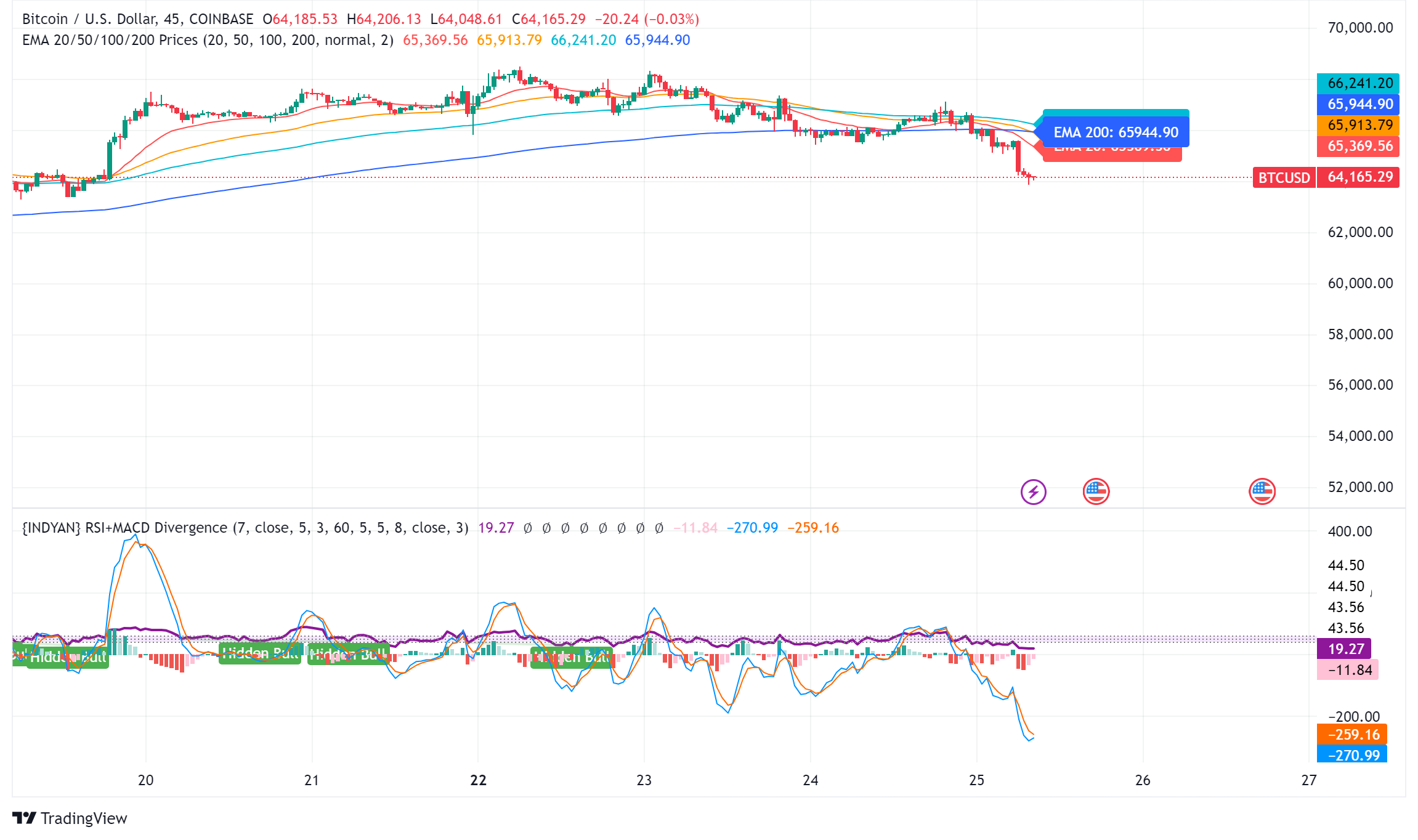
The world’s largest cryptocurrency, Bitcoin (BTC), suffered a significant price decline on Wednesday, falling below $65,000. The decline coincides with a broader market sell-off that has hit technology stocks hard.
Cryptocurrency Liquidations Hit Hard
CoinGlass data reveals a surge in long liquidations in the cryptocurrency market over the past 24 hours. These liquidations, totaling $220.7 million, represent forced selling of positions that had bet on price increases. Bitcoin itself accounted for $14.8 million in long liquidations.
Ethereum leads the decline
Ethereal (ETH), the second-largest cryptocurrency, has seen a steeper decline than Bitcoin, falling nearly 8% to trade around $3,177. This decline mirrors Bitcoin’s price action, suggesting a broader market correction.
Cryptocurrency market crash mirrors tech sector crash
The cryptocurrency market decline appears to be linked to the significant losses seen in the U.S. stock market on Wednesday. Stock market listing The index, heavily weighted toward technology stocks, posted its sharpest decline since October 2022, falling 3.65%.
Analysts cite multiple factors
Several factors may have contributed to the cryptocurrency market crash:
- Tech earnings are underwhelming: Earnings reports from tech giants like Alphabet are disappointing (Google(the parent company of), on Tuesday, triggered a sell-off in technology stocks with higher-than-expected capital expenditures that could have repercussions on the cryptocurrency market.
- Changing Political Landscape: The potential impact of the upcoming US elections and changes in Washington’s policy stance towards cryptocurrencies could influence investor sentiment.
- Ethereal ETF Hopes on the line: While bullish sentiment around a potential U.S. Ethereum ETF initially boosted the market, delays or rejections could dampen enthusiasm.
Analysts’ opinions differ
Despite the short-term losses, some analysts remain optimistic about Bitcoin’s long-term prospects. Singapore-based cryptocurrency trading firm QCP Capital believes Bitcoin could follow a similar trajectory to its post-ETF launch all-time high, with Ethereum potentially converging with its previous highs on sustained institutional interest.
Rich Dad Poor Dad Author’s Prediction
Robert Kiyosaki, author of the best-selling Rich Dad Poor Dad, predicts a potential surge in the price of Bitcoin if Donald Trump is re-elected as US president. He predicts a surge to $105,000 per coin by August 2025, fueled by a weaker dollar that is set to boost US exports.
BTC/USD Technical Outlook
Bitcoin price is currently trading below key support levels, including the $65,500 level and the 100 hourly moving average. A break below the $64,000 level could lead to further declines towards the $63,200 support zone. However, a recovery above the $65,500 level could trigger another increase in the coming sessions.
-

 Videos4 weeks ago
Videos4 weeks agoAbsolutely massive: the next higher Bitcoin leg will shatter all expectations – Tom Lee
-

 News12 months ago
News12 months agoVolta Finance Limited – Director/PDMR Shareholding
-

 News12 months ago
News12 months agoModiv Industrial to release Q2 2024 financial results on August 6
-

 News12 months ago
News12 months agoApple to report third-quarter earnings as Wall Street eyes China sales
-

 News12 months ago
News12 months agoNumber of Americans filing for unemployment benefits hits highest level in a year
-

 News1 year ago
News1 year agoInventiva reports 2024 First Quarter Financial Information¹ and provides a corporate update
-

 News1 year ago
News1 year agoLeeds hospitals trust says finances are “critical” amid £110m deficit
-

 Markets1 year ago
Markets1 year agoWhale Investments in Bitcoin Hit $100 Billion in 2024, Fueling Insane Investor Optimism ⋆ ZyCrypto
-

 DeFi1 year ago
DeFi1 year ago🏴☠️ Pump.Fun operated by Insider Exploit
-

 Videos1 year ago
Videos1 year ago$1,000,000 worth of BTC in 2025! Get ready for an UNPRECEDENTED PRICE EXPLOSION – Jack Mallers
-

 Videos1 year ago
Videos1 year agoABSOLUTELY HUGE: Bitcoin is poised for unabated exponential growth – Mark Yusko and Willy Woo
-

 Tech1 year ago
Tech1 year agoBlockDAG ⭐⭐⭐⭐⭐ Review: Is It the Next Big Thing in Cryptocurrency? 5 questions answered












